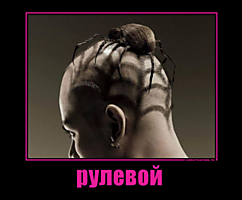12 facts about the intricacies of the Russian language
 Bashny.Net
Bashny.Net
Let's be honest: do you know how it turns out with "victory" and "run"?.. A compilation of reflections about the Russian language, which proves that to learn it the alien will be Oh so easy!
1. Only in our country, the word "yeah" is synonymous with the words "please" and "thank you", "good afternoon", "not at all" and "sorry" and the word "come" in most cases, replace "goodbye".
2. How to translate into other languages that "very smart" isn't always a compliment, "very smart" is an insult, and "too smart" — a threat?
3. Why we have the future, present and past, but still real time, we can Express the past tense ("I Go yesterday on the street..."), and future ("Tomorrow I go to the movies"), and the last time we can Express an order ("go away from here!")?
4. There are languages where you may use a double negative there — which is not allowed; in terms of languages a double negative can Express approval, but only in the Russian language dual statement "well, Yes, of course!" — expresses negation or doubt the words of the speaker.
5. All foreigners learning Russian, wonder why nothing can mean not only "nothing" and "fine", "good", "excellent", and "all right" and "not worth the apology".
6. In the Russian language the same obscene expressions and insult, and admire, and to Express all other shades of emotion.
7. In a stupor person who study Russian, can enter the phrase, "Yes, probably", at the same time bearing in itself the claim, denial, and uncertainty, but still unsure of expressing negation with a hint of possible positive solutions.
8. Try to clearly explain the difference between "tea" and "tea"; what's the difference between "here" and "here"; why is the action in the past can be put into words "before," "long ago" and "recently", "recently", "recently" and a dozen others, and why in certain situations they can be replaced each other?
9. Try to explain to a foreigner the phrase "Hands do not reach to see."
10. How to pinpoint the mood with the subjunctive when it expresses in different situations and condition, and request and desire, and daydreaming, and the need for, and the assumption, and the proposal, and regret?
11. In the Russian language sometimes the verb has no forms, and this is due to the laws of euphony. For example: "win". He wins, you win, I win...? run? the winning? Philologists suggest using a replacement design, "I will win" or "become a winner". Since the form of the first person singular is missing, the verb is inadequate.
12. The glass on the table and the fork is. If we stick a fork in the countertop, fork will stand. Then there are vertical objects, and are horizontal?
Added on the table plate and pan. They're kind of like horizontal, but on the table are. Now put the dish in the pan. There she lies, but on the table stood. Maybe there are items ready to use? No, plug-it was ready when lying.
Now on the table gets a cat. She can stand, sit and lie. If in terms of standing and lying she somehow creeps into the logic of the "vertical-horizontal", the seat is a new property. She sits on the priest. Now on the table sat a bird. She sits on the table, but sitting on the feet, not on the priest. Although it seems must stand. But she can't stand at all. However, if we kill the poor bird and make a Scarecrow, it will be on the table stand.
It may seem that seat — an attribute of the living, but the boot on the foot sits, although he is not alive and has no priests. So podi understand that it is worth what is, and what sits.
And we wonder what foreigners think our language is complex and compare with the Chinese.
published
P. S. And remember, only by changing their consumption — together we change the world! ©
Join us in Facebook and in Vkontakte, and we're Classmates
Source: www.factroom.ru/life/russian-language

1. Only in our country, the word "yeah" is synonymous with the words "please" and "thank you", "good afternoon", "not at all" and "sorry" and the word "come" in most cases, replace "goodbye".
2. How to translate into other languages that "very smart" isn't always a compliment, "very smart" is an insult, and "too smart" — a threat?
3. Why we have the future, present and past, but still real time, we can Express the past tense ("I Go yesterday on the street..."), and future ("Tomorrow I go to the movies"), and the last time we can Express an order ("go away from here!")?
4. There are languages where you may use a double negative there — which is not allowed; in terms of languages a double negative can Express approval, but only in the Russian language dual statement "well, Yes, of course!" — expresses negation or doubt the words of the speaker.
5. All foreigners learning Russian, wonder why nothing can mean not only "nothing" and "fine", "good", "excellent", and "all right" and "not worth the apology".
6. In the Russian language the same obscene expressions and insult, and admire, and to Express all other shades of emotion.
7. In a stupor person who study Russian, can enter the phrase, "Yes, probably", at the same time bearing in itself the claim, denial, and uncertainty, but still unsure of expressing negation with a hint of possible positive solutions.
8. Try to clearly explain the difference between "tea" and "tea"; what's the difference between "here" and "here"; why is the action in the past can be put into words "before," "long ago" and "recently", "recently", "recently" and a dozen others, and why in certain situations they can be replaced each other?
9. Try to explain to a foreigner the phrase "Hands do not reach to see."
10. How to pinpoint the mood with the subjunctive when it expresses in different situations and condition, and request and desire, and daydreaming, and the need for, and the assumption, and the proposal, and regret?
11. In the Russian language sometimes the verb has no forms, and this is due to the laws of euphony. For example: "win". He wins, you win, I win...? run? the winning? Philologists suggest using a replacement design, "I will win" or "become a winner". Since the form of the first person singular is missing, the verb is inadequate.
12. The glass on the table and the fork is. If we stick a fork in the countertop, fork will stand. Then there are vertical objects, and are horizontal?
Added on the table plate and pan. They're kind of like horizontal, but on the table are. Now put the dish in the pan. There she lies, but on the table stood. Maybe there are items ready to use? No, plug-it was ready when lying.
Now on the table gets a cat. She can stand, sit and lie. If in terms of standing and lying she somehow creeps into the logic of the "vertical-horizontal", the seat is a new property. She sits on the priest. Now on the table sat a bird. She sits on the table, but sitting on the feet, not on the priest. Although it seems must stand. But she can't stand at all. However, if we kill the poor bird and make a Scarecrow, it will be on the table stand.
It may seem that seat — an attribute of the living, but the boot on the foot sits, although he is not alive and has no priests. So podi understand that it is worth what is, and what sits.
And we wonder what foreigners think our language is complex and compare with the Chinese.
published
P. S. And remember, only by changing their consumption — together we change the world! ©
Join us in Facebook and in Vkontakte, and we're Classmates
Source: www.factroom.ru/life/russian-language
Tags
See also
12 intricacies of Russian language
15 errors in the English language, which makes the carriers Russian
15 errors in the English language, which makes the carriers Russian
15 errors in the English language, which makes the carriers Russian
Interesting facts from the "destiny" Russian padded jacket
38 RULES OF RUSSIAN LANGUAGE TO WHOM YOU NOWHERE learn
10 most common mistakes in the Russian language, that it is high time to eradicate.
Seven curious facts about the English language, which we did not know
15 amazing features of the Russian language, which put foreigners in a dead end
Facts about hats

















